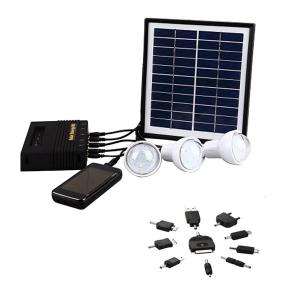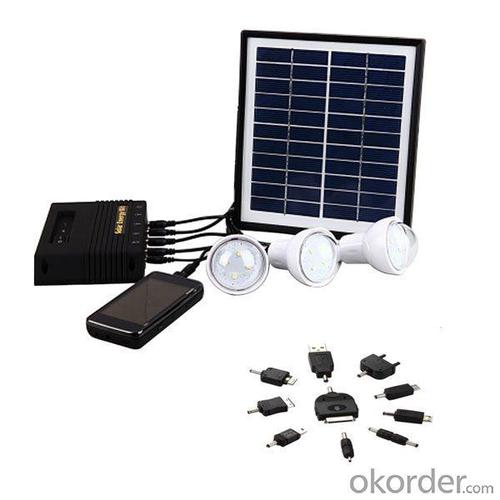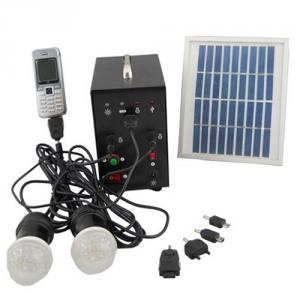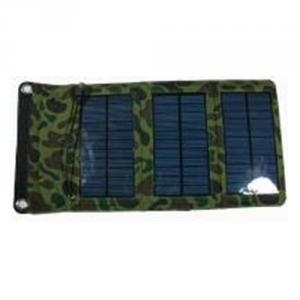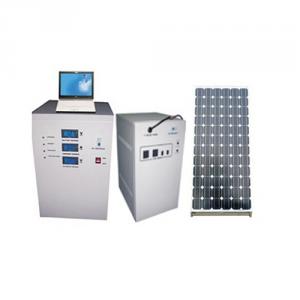4W Solar Lighting System With Mobile Charge for iPhone 4W Solar Panel 4000mah Lithium Battery Black CE ROHS
- Loading Port:
- Shenzhen
- Payment Terms:
- TT/LC
- Min Order Qty:
- 100Sets set
- Supply Capability:
- 20000 SETS Per Month set/month
OKorder Service Pledge
OKorder Financial Service
You Might Also Like
This 4w solar lighting system with mobile charge for iphone 4w solar panel 4000mah lithium batetry black ce rohs is a portable solar energy system , solar energy generator can generate power for 3 LED of 0.8W 80lm, it can work 6 hours every day.
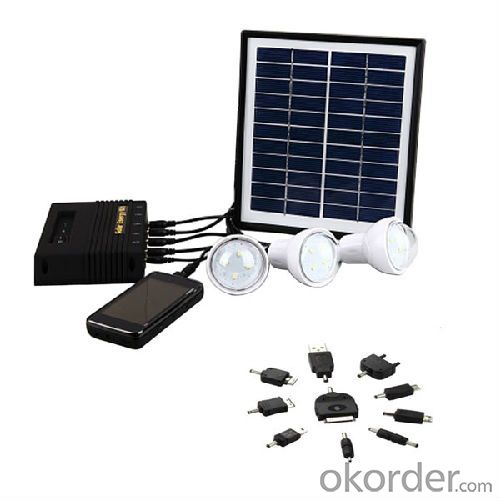
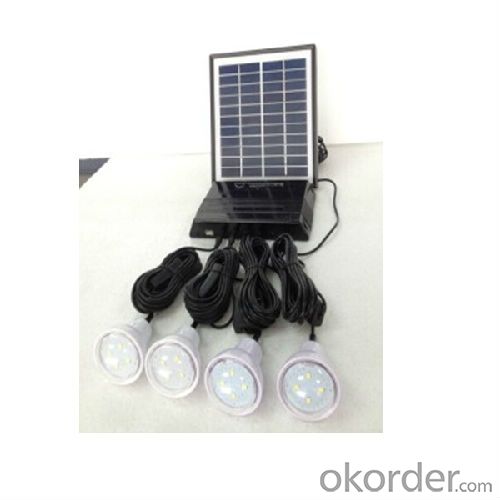
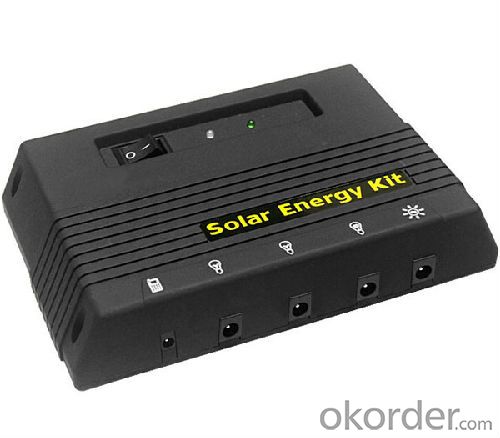
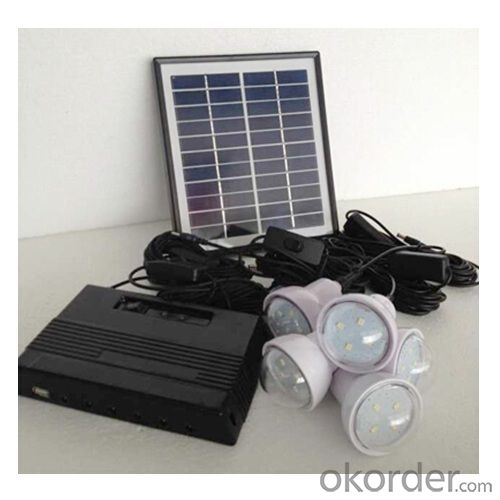
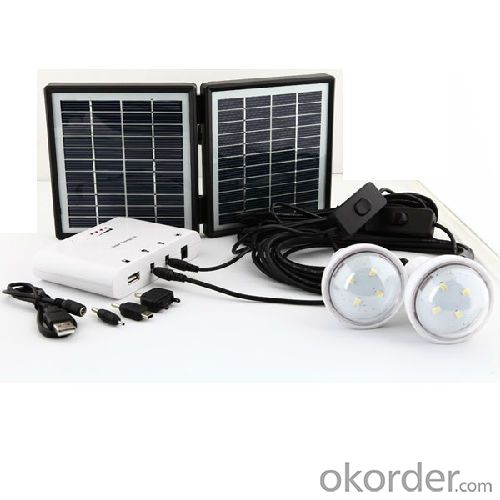
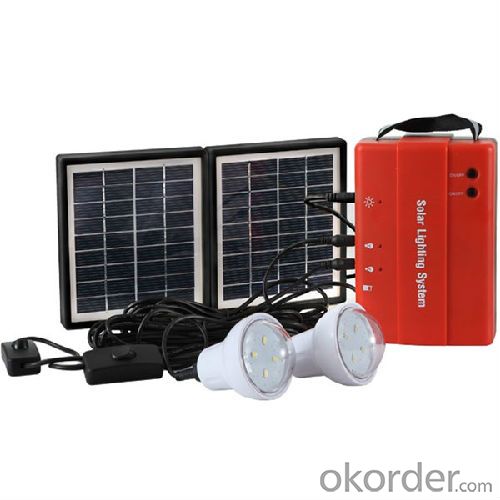
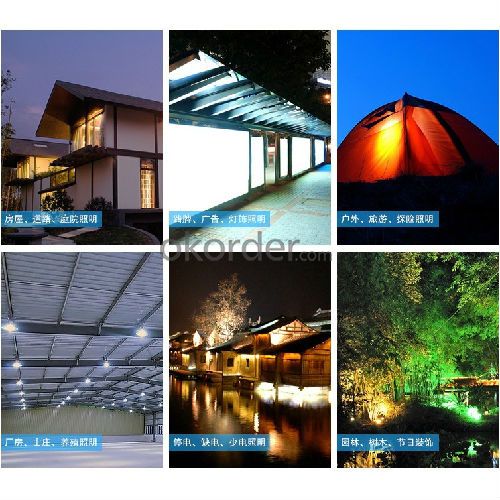
Parameter
| 1 Rechargeable by solar 4W/11V |
| 2 Mobile phone charge output: 5V 1A |
| (Ten kinds of charging connectors ) |
| 3 Material: ABS |
| 4 Battery: 4000mAH 7.4V li ion battery for optional |
| 5 Light Source: LED 0.9W*3pc 80lm |
| 6 Lighting time: 8 - 24 hours working after fully charged |
| 7 Overcharge, overdischarge protection. |
| 8 Accessory: Three LED Lights 0.8W each with 3 meters long line cord. |
Features
Portable Solar Energy System
1.Solar Energy Generator
2.LED: 0.8W*3pc 80lm
3.Working 6 hrs every day
CE, ROHS,
With 1 years warranty.
Usage/Applications
Rural homes, campers, fishermen, outdoor campaigns or activities, etc. Remote area, mountainous area, desert area, grassland area,
Village, country area, Camping, outdoor activities, travel, Lighting at night.
Customized options
1. OEM/ODM available;
2. It's also available to customize your own solar lighting systems, solar lanterns, or any solar lighitng products by giving us solar lights picture / 3D draft / technical datas.
Packing & Delivery
Package:
1* soalr panel
1* recharegable battery
3* LED bulbs with on/off button on cable
inner box size: 305*202*85mm
10pcs/carton
carton size:425*320*440mm
Delivery:
|
Shipping Service |
Estimated Delivery Time |
|
DHL |
2-8 business days |
|
FedEx |
3-8 business days |
|
TNT |
2-10 business days |
|
UPS |
1-7 business days |
|
EMS |
6-14 business days |
|
ePacket |
7-12 business days |
|
China Post Air Mail |
7-15 business days |
|
China Post SAL |
14-30 business days |
|
Air freight |
3-10 business days |
|
By Sea |
30-40 business days |
1. 3-5 business days for Sample Orders; 7-30 business days for Bulk Orders for Bulk Orders.
2. "Business days" means Monday-Friday, excluding holidays.
3. DHL and UPS cannot ship to military or P.O. boxes address
4. The Shipping Service above is for reference only, for any other questions, please feel free to contact us.
Factory
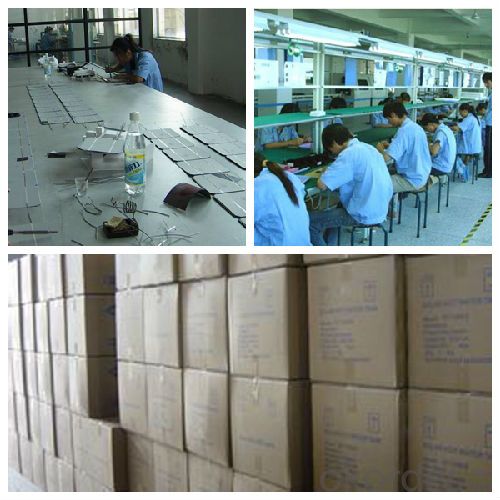
- Q: Can solar energy systems be used in areas with limited access to emergency services?
- Yes, solar energy systems can be used in areas with limited access to emergency services. Solar energy systems are independent power sources that can provide electricity even in remote locations. They do not require a connection to the grid or rely on emergency services for operation. This makes them suitable for areas with limited access to emergency services, as they can provide reliable and sustainable power without being reliant on external infrastructure.
- Q: How do solar energy systems impact the reduction of energy transmission losses?
- Solar energy systems help reduce energy transmission losses by generating electricity directly at the point of consumption. This eliminates the need for long-distance transmission of electricity, which can result in significant losses due to resistance in power lines. By generating electricity on-site, solar energy systems minimize transmission distances, reducing energy losses and increasing overall efficiency.
- Q: How does the efficiency of solar panels vary across different panel technologies?
- The efficiency of solar panels can vary significantly across different panel technologies. Traditional silicon-based panels, also known as monocrystalline or polycrystalline panels, have an average efficiency range of 15% to 20%. However, newer technologies like thin-film solar panels, such as amorphous silicon or cadmium telluride, have lower efficiencies ranging from 10% to 12%. On the other hand, emerging technologies like perovskite solar cells have shown great promise with efficiencies exceeding 25%. Therefore, it can be concluded that the efficiency of solar panels varies based on the specific technology employed.
- Q: What is the role of solar energy systems in reducing reliance on fossil fuels?
- Solar energy systems play a crucial role in reducing reliance on fossil fuels by harnessing the power of the sun to generate clean and renewable electricity. By providing a sustainable alternative to fossil fuel-based energy sources, solar energy systems help to decrease greenhouse gas emissions and combat climate change. Additionally, solar energy systems offer a decentralized and distributed energy generation model, empowering individuals and communities to become energy self-sufficient and less reliant on centralized fossil fuel power plants.
- Q: What are the different incentives available for installing solar energy systems?
- There are several incentives available for installing solar energy systems, which can make this renewable energy source more financially feasible for homeowners and businesses. One of the most common incentives is the federal investment tax credit (ITC). The ITC allows individuals or businesses to deduct a percentage of the cost of installing a solar system from their federal taxes. Currently, the ITC offers a 26% tax credit for residential systems and commercial systems installed before the end of 2022. Another incentive is net metering, which allows solar system owners to receive credit for the excess electricity their system generates and feeds back into the grid. With net metering, homeowners can offset their electricity bills by using these credits during times when their solar panels do not produce enough energy, such as at night or during cloudy days. Many states also offer additional incentives, such as grants, rebates, or performance-based incentives, to further encourage the adoption of solar energy systems. These incentives vary by state but can significantly reduce the upfront costs of installing solar panels. Some utility companies also provide incentives through solar renewable energy certificates (SRECs). SRECs are tradable credits that represent the environmental attributes of a certain amount of electricity generated from solar energy. By generating solar electricity, homeowners or businesses can earn these SRECs and sell them to utilities, providing an additional source of income. Lastly, some local governments offer property tax exemptions or deductions for installing solar energy systems. This means that the added value of the solar system to a property is not subject to increased property taxes, making solar installations financially more attractive. All of these incentives help offset the initial investment and ongoing costs of solar energy systems, making them a more viable and affordable option for those interested in adopting renewable energy and reducing their carbon footprint.
- Q: Can solar energy systems be used in areas with frequent lightning strikes?
- Yes, solar energy systems can be used in areas with frequent lightning strikes. While lightning strikes can pose a risk to any electrical system, including solar panels, there are measures in place to mitigate this risk. Solar panels are designed to withstand various weather conditions, including lightning strikes. They are built to be durable and capable of handling external stressors, such as electrical surges caused by lightning. Additionally, solar panels are grounded using lightning protection systems to divert the electrical charge safely into the ground, reducing the risk of damage to the system. Furthermore, solar energy systems typically include surge protection devices and lightning arresters that help dissipate and redirect electrical surges caused by lightning strikes. These protective measures help safeguard the system and prevent any potential damage. It is important to note that while solar energy systems can generally withstand lightning strikes, it is still recommended to consult with a professional installer and follow local electrical codes and regulations to ensure proper installation and protection against lightning strikes.
- Q: Can solar energy systems be used for powering manufacturing facilities?
- Yes, solar energy systems can be used for powering manufacturing facilities. Solar power systems can generate electricity to meet the energy demands of manufacturing processes, reducing reliance on traditional fossil fuel-based electricity. This renewable energy source can contribute to sustainable and environmentally friendly manufacturing practices while potentially lowering operational costs in the long run.
- Q: Can solar energy systems be installed in any location?
- Solar energy systems can be installed in most locations, as long as there is sufficient access to sunlight. However, factors such as shading, orientation, and roof condition can affect their efficiency. Additionally, local regulations and building codes may impose restrictions on the installation of solar panels in certain areas.
- Q: Can a solar energy system be used to charge electric vehicles?
- It is indeed possible to utilize a solar energy system for the purpose of charging electric vehicles. The sun's rays are harnessed by solar panels, also referred to as photovoltaic (PV) panels, to generate electricity. This electricity can then be employed to charge the batteries of electric vehicles. The PV panels capture sunlight and convert it into direct current (DC) electricity. Subsequently, an inverter is used to transform this DC electricity into alternating current (AC) electricity, which aligns with the charging requirements of electric vehicles. By establishing a link between the solar energy system and an electric vehicle charging station, the solar-generated electricity can directly charge the vehicle's battery. This renewable energy source not only diminishes the dependence on fossil fuels but also aids in reducing the emission of greenhouse gases associated with transportation. Moreover, any surplus electricity generated by the solar panel system during daylight hours can be stored in batteries or returned to the grid for future use, guaranteeing a continuous and sustainable power supply for charging electric vehicles.
- Q: Can solar energy systems be used for transportation?
- Yes, solar energy systems can be used for transportation. Solar energy can be harnessed to power different types of vehicles, including cars, buses, boats, and even airplanes. Solar-powered vehicles use photovoltaic (PV) cells to convert sunlight into electricity, which can then be stored in batteries or used directly to power the vehicle's electric motor. Solar panels can be installed on the roof, hood, or any other suitable surface of the vehicle to capture sunlight and generate electricity. While solar-powered transportation is still relatively limited in terms of range and speed compared to traditional fossil fuel-powered vehicles, advancements in solar technology are continuously improving the efficiency and performance of these systems. Furthermore, solar energy can also be utilized in transportation infrastructure, such as solar-powered charging stations for electric vehicles, providing a sustainable and renewable alternative to traditional energy sources.
1. Manufacturer Overview
| Location | |
| Year Established | |
| Annual Output Value | |
| Main Markets | |
| Company Certifications |
2. Manufacturer Certificates
| a) Certification Name | |
| Range | |
| Reference | |
| Validity Period |
3. Manufacturer Capability
| a) Trade Capacity | |
| Nearest Port | |
| Export Percentage | |
| No.of Employees in Trade Department | |
| Language Spoken: | |
| b) Factory Information | |
| Factory Size: | |
| No. of Production Lines | |
| Contract Manufacturing | |
| Product Price Range | |
Send your message to us
4W Solar Lighting System With Mobile Charge for iPhone 4W Solar Panel 4000mah Lithium Battery Black CE ROHS
- Loading Port:
- Shenzhen
- Payment Terms:
- TT/LC
- Min Order Qty:
- 100Sets set
- Supply Capability:
- 20000 SETS Per Month set/month
OKorder Service Pledge
OKorder Financial Service
Similar products
Hot products
Hot Searches
Related keywords
